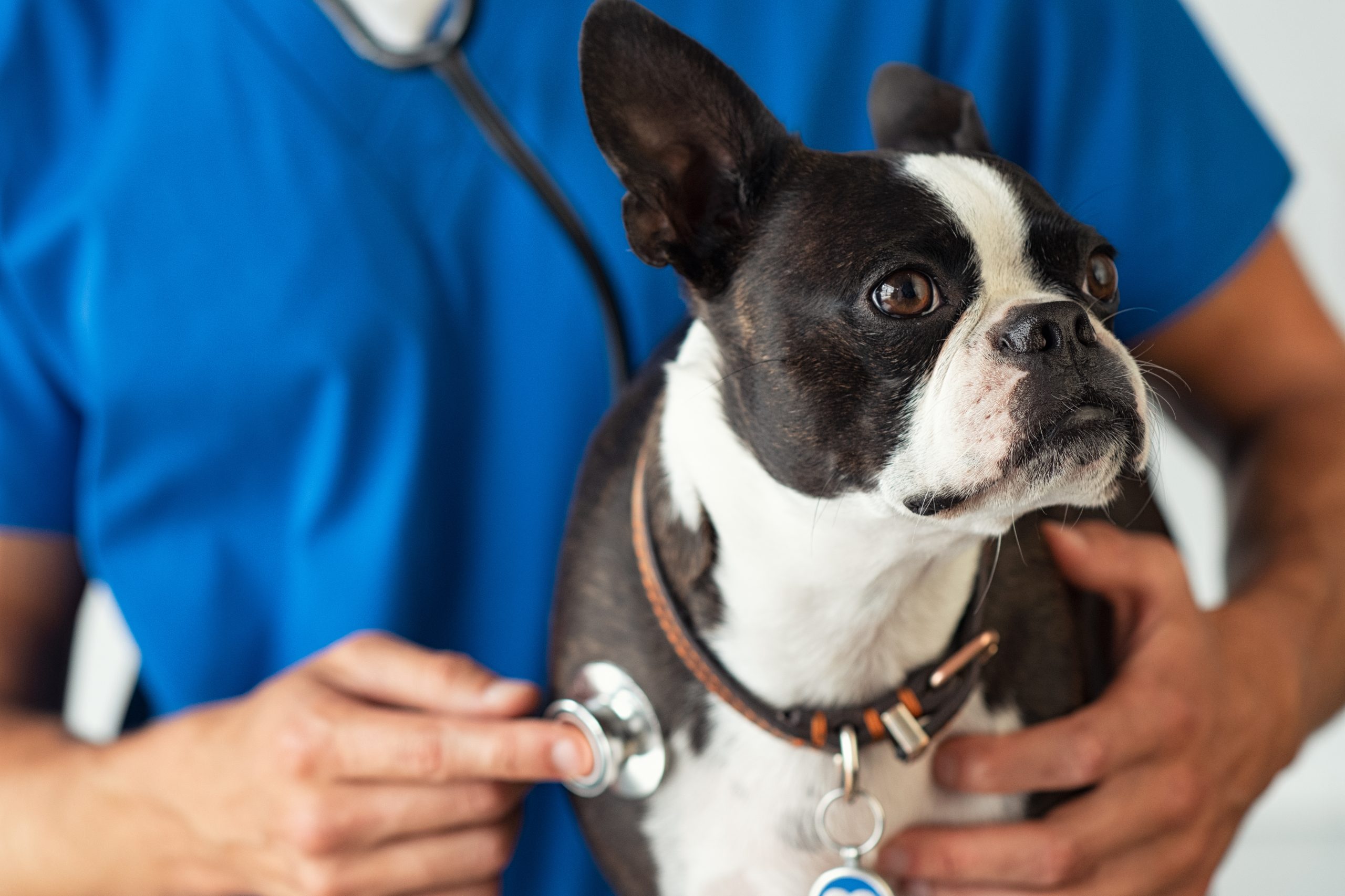
C-Reactive Protein (CRP) and albumin have long been used independently as markers for prognosis. Patients with either high inflammation or low albumin have tended to have worse outcomes. The use of the C-reactive protein/ albumin ratio (CAR) is growing in human medicine as a prognostic index for disease severity. With the growing use of CRP in dogs for wellness and acute care, adding CAR to the workup of patients provides additional insight into the status of the dog, helping determine the urgency of intervention.
Table of Contents:
- Acute Phase Proteins & Inflammation
- CAR (CRP/Albumin Ratio)
- CRP testing with VDI Laboratory – with CAR
- References
Acute Phase Proteins & Inflammation
The inflammatory response is an important innate immune process that protects the body when tissues are injured by an array of pathogens, trauma, toxic compounds, heat, or other causes. Working properly, the acute inflammatory response quickly activates complement and promotes phagocytic activity and then returns to a steady state, ready to respond when injury occurs again. Returning to a low inflammatory state is vital for proper response. Even with simple vaccinations, a study found that “Inflammation, even subclinical, can result in the development of an immunological risk group, in which vaccination fails to provide sufficient immunity” (1).
C-Reactive Protein
It is generally recognized that the best marker for measuring the inflammatory response are the acute phase proteins. The major positive acute phase protein in dogs is C-Reactive Protein. CRP concentrations can increase 100-fold and rise quickly; typically, within 24-48 hours. Measuring CRP can be useful clinically in these situations:
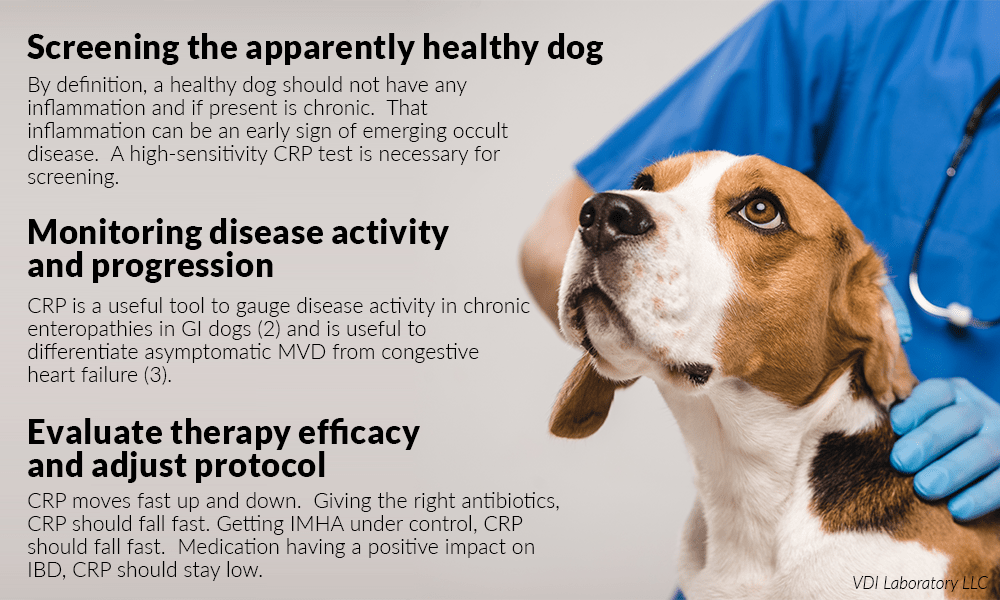
Albumin
Albumin primarily serves as a transport protein within in the body. While not connected to the acute phase response, indirectly albumin serves as a negative acute phase protein, opposite of CRP, in the presence of increased inflammatory burden.
Like other negative acute phase proteins, Albumin synthesis decreases in order to save amino acids for creating additional positive acute phase proteins. When an inflammatory condition requires a halt to albumin production to maintain or bolster the immune response, the disease is typically serious and/or the body is struggling to manage. As CRP levels rise, and albumin levels drop, severity increases and prognosis is poorer – this is the CRP/Albumin Ratio, or CAR.
CAR – CRP/Albumin Ratio
High CAR values, where the body is in a high inflammatory state with low albumin, has demonstrated poor outcomes in cancer survival, post-surgical complications, sepsis mortality, and other serious disorders. New studies in canines, show CAR to be a better metric than CRP or albumin alone for length of hospital stay/ time of recovery in a variety of serious diseases and relative risk of death in dogs with acute pancreatitis (4,5).
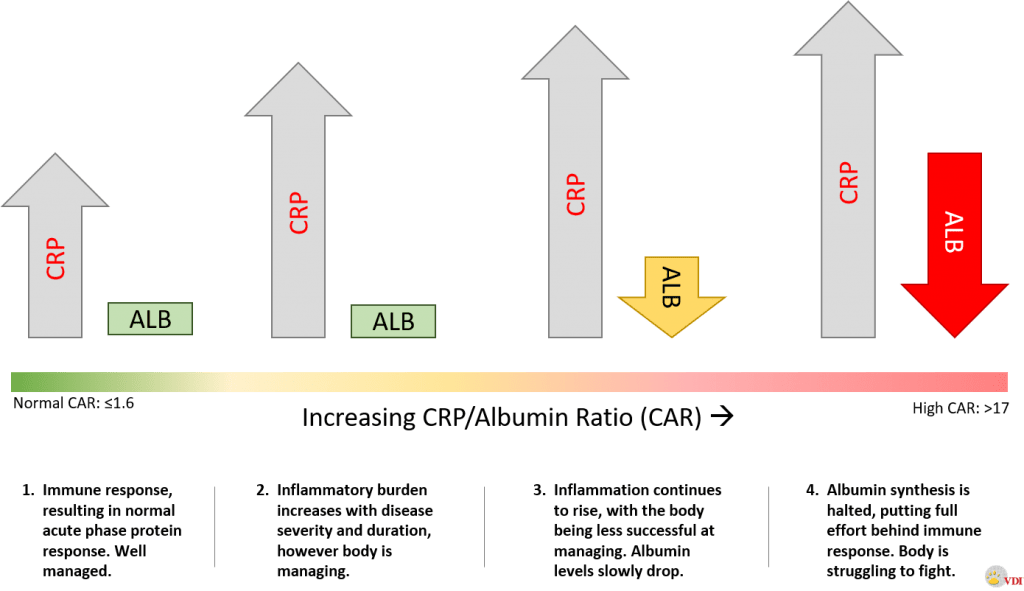
CRP Testing with VDI Laboratory
In addition to standalone CRP testing, VDI offers a number of panels that include CRP. See below a list of some base panels that include CRP and click the sample report image for examples. Not all combinations of CRP tests/panels are shown.
Canine Wellness Panels
Wellness panels for dogs, including CRP will now get CAR whenever possible. CAR is useful in determining the seriousness of any inflammation present.
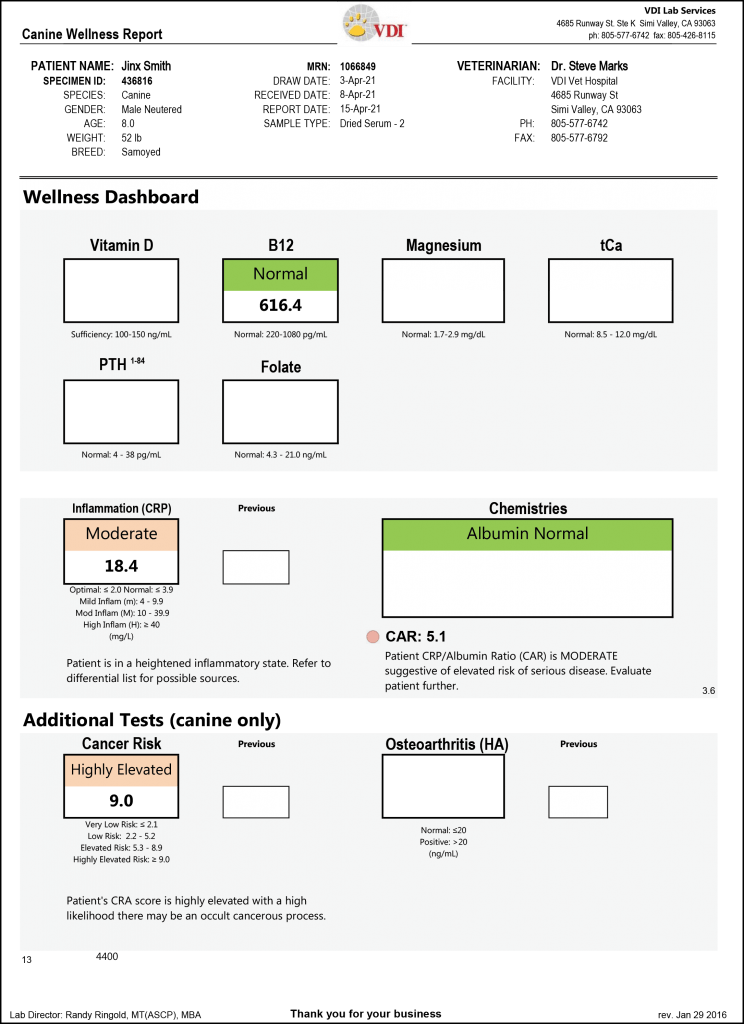
Cancer Panels, GI Lymphoma Panels, and Advanced GI Panels
With the VDI Cancer Panel, CAR is now displayed under the CRP section.
Note: CAR does not influence the Neoplasia Index (NI).
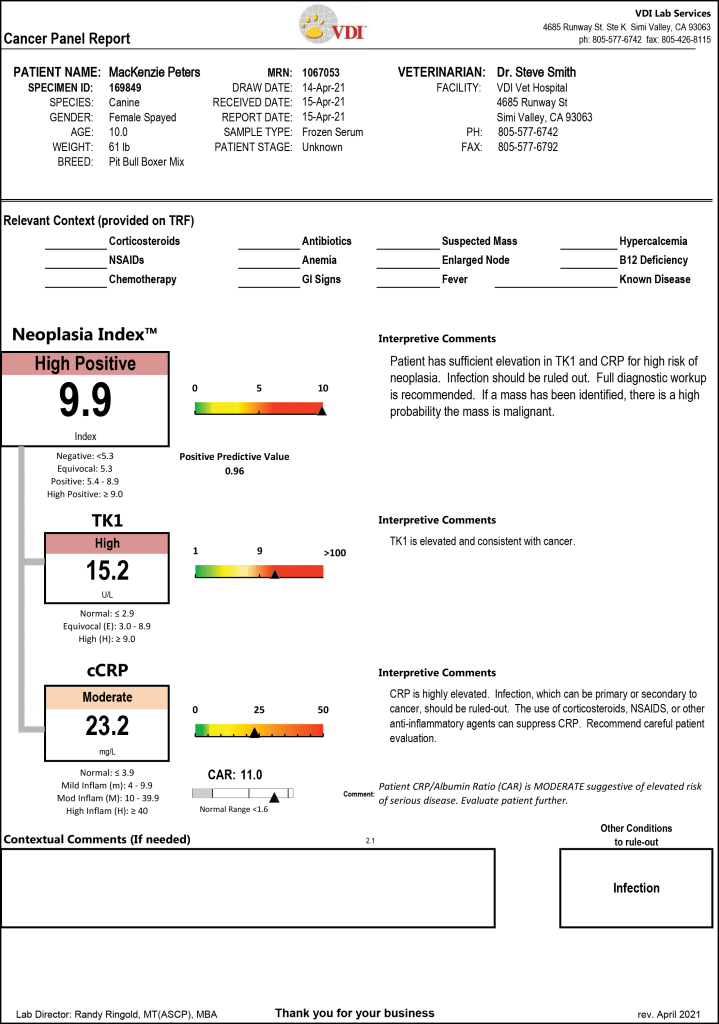
Common VDI panels now including CAR:
- Essential Wellness
- Complete Wellness
- Cancer Panel
- Cancer Panel + Vitamin D
- Inflammation + Vitamin D
- Advanced GI Panel
CAR is added to VDI panels at no additional cost to the listed price. Any CRP test, where sample is available, will have Albumin run and a CAR available. Contact VDI at 805-577-6742 for any questions, or email: office@vdilab.com.
References
- Povey RC. Distempter vaccination of dogs: factors which could cause vaccine failure. Can Vet J. 1986 Sep;27(9):321-3. PMID: 17422690; PMCID: PMC1680307
- Jergens AE, Schreiner CA, Frank DE, Niyo Y, Ahrens FE, Eckersall PD, Benson TJ, Evans R. A scoring index for disease activity in canine inflammatory bowel disease. J Vet Intern Med. 2003 May-Jun;17(3):291-7. doi: 10.1111/j.1939-1676.2003.tb02450.x. PMID: 12774968.
- Reimann MJ, Ljungvall I, Hillström A, Møller JE, Hagman R, Falk T, Höglund K, Häggström J, Olsen LH. Increased serum C-reactive protein concentrations in dogs with congestive heart failure due to myxomatous mitral valve disease. Vet J. 2016 Mar;209:113-8. doi: 10.1016/j.tvjl.2015.12.006. Epub 2015 Dec 22. PMID: 26831162.
- Gori E, Pierini A, Lippi I, Ceccherini G, Perondi F, Marchetti V. Evaluation of C-reactive protein/albumin ratio and its relationship with survival in dogs with acute pancreatitis. N Z Vet J. 2020 Nov;68(6):345-348. doi: 10.1080/00480169.2020.1780995. Epub 2020 Jul 7. PMID: 32539626.
- Fabretti K, Siqueira R, Amaral H, Kemper D, Chaves R, Pereira P. Determination of the reference interval of the C-reactive protein/albumin ratio and its efficiency, CRP and albumin as prognostic markers in dogs. Presq. Vet. Bras.2020 Mar;40(3):202-209. Doi: 10.1590/1678-5150-PVB-6484.
- Yamamoto S, Miyaji S, Abe N, Otabe K, Furukawa E, Naiki M. Canine C-reactive protein (CRP) does not share common antigenicity with human CRP. Vet Res Commun. 1993;17(4):259-66. doi: 10.1007/BF01839216. PMID: 8146951.
